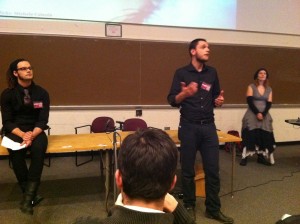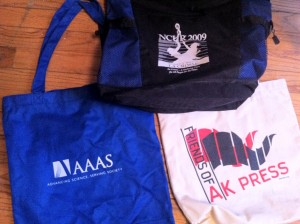
This past weekend Cyborgology editors PJ Rey and Nathan Jurgenson treated over two hundred (mostly) young academics to a new kind of conference. In some ways it was like any other conference: some people (me included) did the necessary grousing about waking up early; there were minor technical mangles [mangle of practice]; and there were some awkward glances at name tags as everyone tried to remember the names of their new professional acquaintances. But unlike some of the larger (dare I say, “mainstream”) conferences, there was a palpable sense of ownership over all aspects of the the project. We were doing this for a reason, and it was not to pad our CV’s. It was to play with the medium. We theorized the web, but in so doing, we also reconsidered the purpose of conferences.
Personally, I am tired of visiting a corporate hotel, adding another tote bag to my collection, and rushing from tablecloth-clad conference rooms to bad catered dinners, so I can make it to a plenary talk about the politics of the discipline. That needs to be over, or academia will stagnate in a pool of its own hypocrisy. Its time for the academic conference to take a reflexive turn. We need to practice what we preach.

What would a reflexive conference look like? TtW2011 was about how we use information technology and how IT changes our day-to-day lives. Through some brilliant art work and our own collective action, we were participating in -and experimenting with- the same activities that we were investigating. Does that mean a conference on social movements needs to run out of the room and topple the university’s administration? Not necessarily. (Although, nine times out of ten, it’d probably be a popular choice of action.) But we, as social justice advocates, should be offering day care and the ability to bring spouses for free or at a reduced rate. It means voting with our dollars and removing ourselves from the same companies that host Halliburton’s executive conferences, or might have questionable hiring practices.
While our own institutions may not be bastions of equality, they are institutions that we are belong to, and can be changed. TtW2011 was hosted at the University of Maryland, the rooms were adequate, and while there were some technical issues, they weren’t any better or worse than experiences I have had at hotels or convention centers. We ended a very productive day by listening to a band and enjoying each-other’s company as colleagues and new-found friends. We were encouraged to eat at local restaurants, and there was a map orienting us to some local favorites.
Theorizing the Web was the beginning of a new interdisciplinary interest, but it was also the start of a new way of sharing information. It was about reflecting on what we think is important, and informing the work that we do with those values. The reactions I have seen have all been really positive, and I think that identifies an underlying desire for a new kind of conference. Its time to get out of the hotel conference room, and go to the streets (and twitter).

Comments 3
Talk in Space: #TtW12 and Knowledge Production » Cyborgology — April 11, 2012
[...] attending that we wanted to avoid. Last year David Banks highlighted some of these points in his piece on TtW2011′s reflexive nature; Personally, I am tired of visiting a corporate hotel, adding another tote bag to my collection, [...]
Overcoming Tote Bag Praxis » Cyborgology — April 18, 2012
[...] than I usually do at weekend-long establishment conferences. I have said a lot about conferences (here, here, and here) as have fellow cyborgologists (Sarah, Nathan, and PJ). All of these posts have a [...]
Toward A More Inclusive Backchannel: An Unusual Call To Action » Cyborgology — August 16, 2012
[...] reports from friends and colleagues rather than on first-hand experience. Disclosure No. 2 is that, like my Cyborgology colleagues, I’m a big fan of what we like to call augmented conferences, or [...]